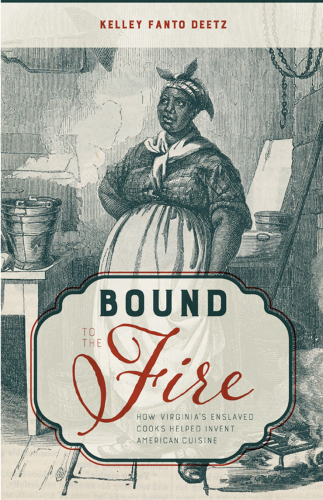
Bound to the Fire
How Virginia's Enslaved Cooks Helped Invent American Cuisine
کتاب های مرتبط
- اطلاعات
- نقد و بررسی
- دیدگاه کاربران
نقد و بررسی

September 4, 2017
Deetz, an assistant professor of history at Roanoke College and a former chef, illuminates the real lives of enslaved cooks on the plantations of 18th- and 19th-century Virginia. Images of African-American cooks in American popular culture, such as Aunt Jemima and Uncle Ben, are largely advertising agency creations associated with servility rather than with creativity or self-determination, she argues. But these men and women shaped both plantation life and Southern cuisine, while occupying a kitchen space that was “a crossroads between black and white worlds.” Though few of these enslaved women and men left written records of their experiences, Deetz draws on sources that include runaway-slave ads, travelogues, and recipe collections in order to catch glimpses of cooks in the kitchen and beyond. Her vivid portraits reveal these cooks producing the African-influenced dishes at the core of Southern hospitality, and occasionally poisoning their owners with those same dishes. Most importantly, Deetz recasts the image of the plantation cook as a figure of power, dignity, and, frequently, resistance. This is a lively and insightful account of a still-largely-unfamiliar aspect of the history of American slavery. Illus.

Starred review from September 15, 2017
Aunt Jemima syrup and Uncle Ben's rice reinforce imagery of friendly black cooks, which Deetz's first book redefines as part of the racist ideology that left the primary contributions enslaved Afro-Virginian cooks made to American cuisine unacknowledged. Her book, nine years in the researching and writing, calls upon plantations still giving tours, historians, chefs, and all Americans to develop an honest awareness of enslaved cooks, specifically in Virginia in the seventeenth and eighteenth centuries. The very architecture of the white elite's preferred Georgian-style mansion replicated in the landscape the separation, control, and power needed to enact enslavement. Kitchens were liminal spaces apart from main houses, which were semipublic entertainment venues. As abolitionist thinking took root, homes evolved to include covered walkways and dumbwaiters, keeping black people hidden while they created meals for white people. Herself a former cook, Deetz ensures her readers understand the significant intellect, physical strength, endurance, and capabilities required for enslaved cooks to produce four meals per day from scratch in hot, open-hearth kitchens while under the constant threat of psychological abuse and violence. Scholarly yet readable, Deetz's book honors these American ancestors by reclaiming their rightful places and stories.(Reprinted with permission of Booklist, copyright 2017, American Library Association.)

























دیدگاه کاربران